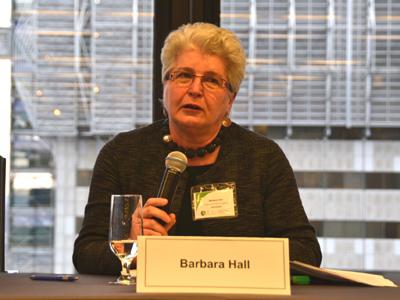A panel of legal experts gathered in a 53rd-floor boardroom at Toronto’s TD Place on March 30. They were there to discuss the tricky question of how to fight for the rights of gay people when those rights appear to conflict with freedom of speech and religion.
Using recent flashpoint human rights issues as case studies, the panel, which included Ontario Human Rights Commissioner (OHRC) Barbara Hall, general counsel for the Canadian Civil Liberties Association (CCLA) Natalie Des Rosiers, and University of Windsor law professor Richard Moon, offered no simple answers.
Xtra reported in January, for example, that the Halton Catholic District School Board specifically banned GSAs from its schools. The board repealed its ban, but more recently the Dufferin Peel Catholic District School Board refused a student request to start a GSA at St Joseph Secondary School in Mississauga, offering instead to allow students to form an umbrella group to promote non-specific diversity and equity. While there are such clubs in various Catholic schools around Ontario, Xtra has so far not found a single example of a GSA. The word “gay” is simply not allowed in club names in Ontario Catholic Schools.
The document used to inform all Ontario Catholic school teachings on the subject of homosexuality, the Pastoral Guidelines to Assist Students of Same-Sex Orientation, denies that gay is a legitimate sexual orientation, refers to gay sex as a sin and urges people never to act on same-sex attraction.
“From the perspective of the [Ontario Human Rights] Code, whether it’s public or private, a school has a duty to provide a discrimination-free environment,” said Hall at the March 30 event.
Hall did not say whether the Catholic boards’ refusal to allow GSAs in its schools is discriminatory. At post time, no formal complaints on that GSA matter had been filed with the OHRC.
“We have to look at what was being done by the schools,” said Hall. “Is it sending the message that it is a safe, supportive place? Children of GLBT parents may claim discrimination against them, and also families with no GLBT connection have a right to education without discrimination.
“You can believe whatever, but you can’t act on every belief if it interferes with someone else,” she added.
The CCLA issued a public statement on March 18 calling on the Halton District Catholic School Board to “transparently permit, encourage and support the creation of GSAs in its schools.” Des Rosiers insisted at the March 30 event that Canadian jurisprudence includes “no right to ban GSAs.”
“It’s a freedom of association question,” she said. “The schools haven’t taken the ‘freedom of religion’ argument. They’re saying that they provide equivalent, more inclusive groups.”
Another complicating factor is that there are specific protections for Ontario and Quebec Catholic schools under Section 93 of the Constitution Acts. But Moon suggested that what role the Catholic doctrine ought to play in formulating school curriculum nevertheless remains an open question.
“The commitment to equality ought to be paramount to schools, especially to the curriculum of schools that are publicly funded,” he said.
Moon added that public bodies need to uphold the law regardless of the religious beliefs of individual public servants.
On the matter of the recent push to allow Saskatoon’s marriage commissioners to opt out of performing same-sex civil marriages, Moon argued that the push to accommodate religious beliefs “rests on a misunderstanding of the law.”
“It’s a civil, not a religious ceremony. [A religious public servant] would have the same problem if he was mailing out pension cheques to a same-sex couple.”
On the issue of hate speech, the panellists seemed to agree that filing human rights complaints are not the best way to respond to offensive speech. Unlike the Canadian Human Rights Commission and the human rights apparatuses of other provinces, the OHRC does not address questions of hate speech, because hate speech is subject to prosecution under the criminal code.
“Regulation and restriction are not the best way to deal with hate speech,” said Moon, who wrote a report to the Canadian Human Rights Commission on the regulation of hate speech on the internet. “Because of its ubiquity, it needs to be dealt with head on,”
Moreover, says Moon, the human rights system is inadequate to deal with hate speech.
“The whole process is designed to work toward reconciliation,” he told the room. “I’m not sure this is the best way to resolve these issues. The process is complainant-driven, which places a real burden on complainants. It is a public matter better dealt with by state agents… But in some provinces, the attorney-general is reluctant to let any prosecution go ahead. It amounts to a nullification of the law.”
But Des Rosiers argued that allegations of hate speech ought not to be prosecuted at all.
“If we start censoring, we lose the capacity to challenge despicable situations,” she said.
Hall suggested that those who feel discriminated against by magazine editorials and other forms of public expression should focus their efforts on letter-writing campaigns and boycotts.
In 2007 the Canadian Islamic Congress filed complaints with the OHRC, the Canadian Human Rights Commission and the British Columbia Human Rights Tribunal alleging Maclean’s magazine had published a series of Islamophobic articles. The OHRC dismissed the complaint on the grounds that the question lay outside its jurisdiction but issued a statement that the Maclean’s articles promoted prejudice toward Muslims. Hall said the attempt to get the media to change its portrayal of Muslims backfired.
“We were beaten up by all the media across the country” she said. “I was called ‘Mommy Censor.’”
Hall says that led her to advise a group of Asian Canadians not to file an OHRC complaint against Maclean’s last year about an article entitled “Too Asian?”
“If we were to get involved, the issue would be us,” she said.


 Why you can trust Xtra
Why you can trust Xtra


